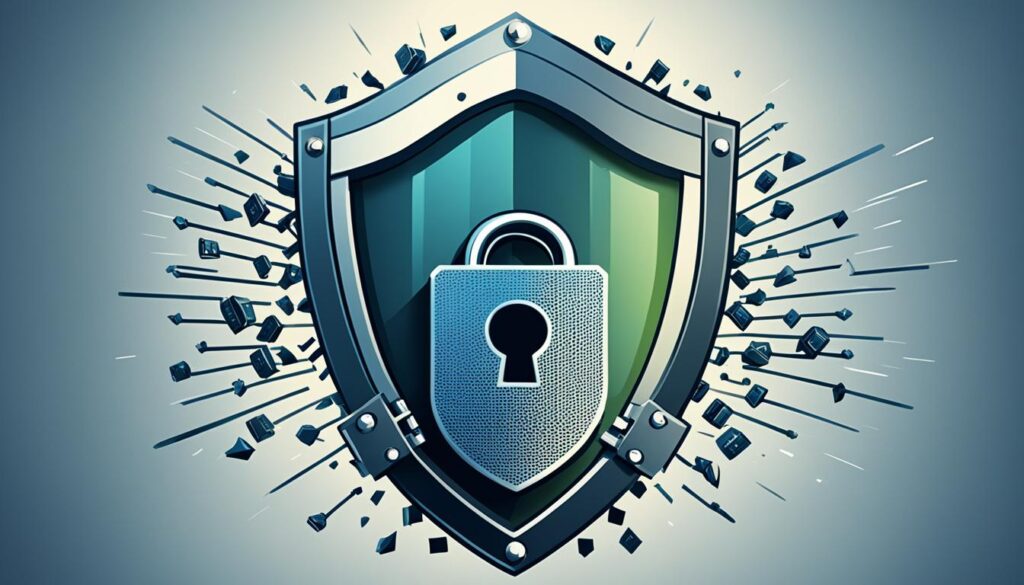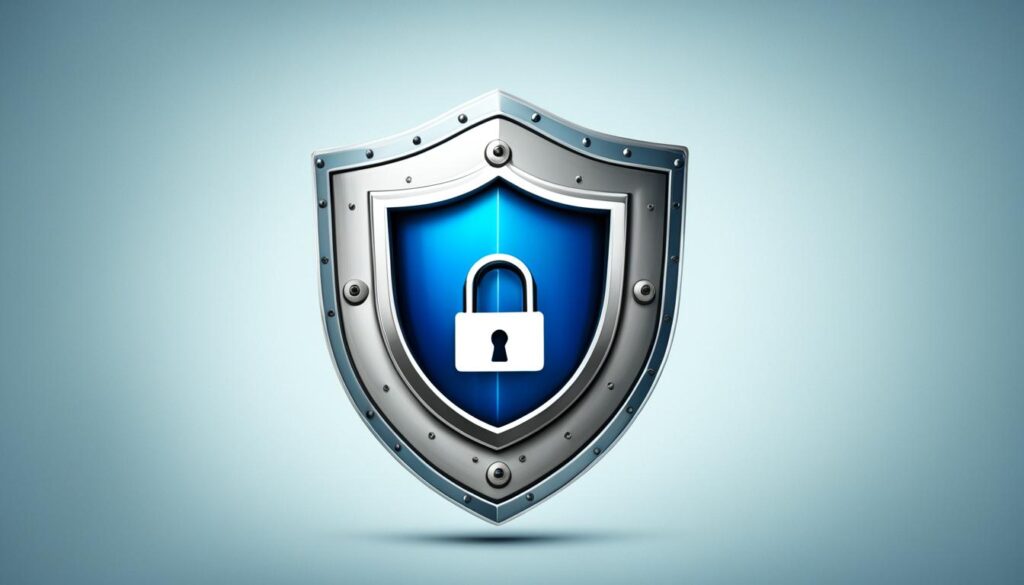In today’s digital world, keeping your website safe from hackers is key. Cybercriminals are always on the lookout for ways to get into your site. If they succeed, they could steal data, harm your reputation, or shut down your site. This article will give you important tips to keep your website safe from hackers.
Key Takeaways
- Understand the importance of website security to protect your business and customers
- Learn about the risks of a hacked website and the potential consequences
- Discover practical steps to shield your website from hackers, such as installing SSL, updating software, and using strong passwords
- Implement robust security measures, including the use of HTTPS protocol and vigilance against phishing emails
- Maintain regular security checks and conduct penetration testing to identify and address vulnerabilities
The Importance of Website Security
In today’s digital world, keeping your website safe is crucial. As a business owner, ignoring the risks of a hacked website is not an option. Cybercriminals are always looking for ways to attack and harm websites.
Risks of a Hacked Website
Getting your website hacked can be a disaster. Hackers might steal customer data like personal and financial info. This loss of trust can lead to legal issues and financial losses for your business. Plus, it can hurt your reputation, making it hard to win back your audience’s trust.
Website Hacking Statistics
Recent studies show the risks of a hacked website are quite high. Sucuri found that about 1-2% of websites they checked might be under attack. This means at least 12 million websites could be hacked right now. Also, 64% of businesses worldwide have faced web attacks, showing the need for strong security.
| Metric | Value |
|---|---|
| Websites with signs of compromise | 1-2% |
| Estimated number of hacked or infected websites worldwide | 12 million |
| Businesses facing web attacks | 64% |
The numbers show the risks of a hacked website are very real and can hurt your business a lot. It’s essential to invest in strong security to protect your online presence and keep your customers’ info safe.
How to Protect Your Website from Hackers
Keeping your website safe from hackers is key in today’s digital world. Using strong website security measures helps protect your online space and keeps your data safe. Here are three key steps to strengthen your website’s security.
Install SSL and Security Plugins
Installing SSL encryption and trusted security plugins is a basic security step. SSL encryption makes sure data between your site and visitors is safe from prying eyes. Security plugins add an extra shield by watching for odd behavior and fixing any weak spots quickly.
Keep Software Updated
It’s vital to update your website’s software often, like the CMS and plugins or themes. Updates usually bring security fixes for new threats. Keeping your site’s software current lowers the chance of hackers getting in.
Use Strong Passwords
Choosing strong passwords is a basic but powerful way to secure your site. Don’t use common words or easy-to-guess info. Go for unique passwords with a mix of letters, numbers, and symbols. Changing your passwords often adds more security.
By taking these steps, you can boost your website security measures and keep your online presence safe from hackers.
Implement Robust Security Measures
In today’s digital world, keeping your website safe is key. Two important steps to make your site more secure are using the HTTPS protocol and watching out for phishing emails.
Use HTTPS Protocol
HTTPS, or Hypertext Transfer Protocol Secure, is the safe version of the usual HTTP protocol. It makes sure data sent between your site and users’ browsers is encrypted. This keeps things like login info and payment details safe. Using HTTPS is a must to build trust with your visitors and keep their data private.
Beware of Phishing Emails
- Phishing emails are a common trick hackers use to get into your website and steal your data.
- These emails look like they’re from trusted places, like banks or service providers, and might have dangerous links or files.
- Teach your team to be careful with emails they don’t expect or seem fishy. Never click on links or download files from unknown sources.
By using the HTTPS protocol and being careful with phishing emails, you can make your website very secure. This helps protect your business and customers from cyber threats.

How to protect your website from hackers
Keeping your website safe from hackers is very important today. Hackers are always finding new ways to get into websites. This puts your data, customer info, and online reputation at risk. But, you can take steps to make your website more secure.
Utilize Robust Firewalls
A strong firewall is key to protecting your website. Firewalls watch and control the traffic to and from your site. They block any activity that looks suspicious. Make sure your firewall is updated to fight the latest threats.
Implement Regular Malware Scanning
It’s important to check your website for malware often. Use a trusted tool or service to scan your site and files for threats. This way, you can catch and fix security issues fast.
Enforce Strong Password Policies
Weak passwords let hackers in. Set strong password rules for your site’s admin accounts. Use complex, unique passwords that change often. Teach your team and users good password habits to boost security.
These steps can make your website much safer. Always be on the lookout for new threats. Keeping your site secure is key to protecting your online presence and your users’ trust.

Secure Your Website’s Infrastructure
In today’s digital world, keeping your website safe is key to protecting it from cyber threats. Two important steps are controlling file uploads and picking a trusted web hosting service.
Control File Uploads
If your site lets users upload files, you must set strict rules for file upload security. Start by limiting file types and sizes. Also, check all files for malware before they’re uploaded. Keep these files in a separate area, away from your main site, to lower the risk of harm.
Choose Reputable Web Hosting
Picking a reputable web hosting service is vital for your site’s safety. Look for hosts that watch their logs for odd behavior and back up your site often. If a cyberattack happens, a good host will help block the bad traffic and lessen the damage. Make sure to check the host’s past on security to pick one that’s reliable.
| Feature | Importance |
|---|---|
| File Upload Security | Prevents the introduction of malware and unauthorized content onto your website |
| Reputable Web Hosting | Ensures your website is hosted on a secure and reliable platform that can effectively respond to and mitigate cyber threats |
By taking these steps, you can make your website’s infrastructure much safer. This helps protect it from hackers and other online threats.
Maintain Regular Security Checks
Keeping your website safe is a constant task that needs careful attention and action. A key part of this is doing regular security checks. This includes website security testing and penetration testing. These checks help find weak spots and give you important info to boost your website’s security against cyber threats.
Conduct Penetration Testing
Penetration testing, or ethical hacking, is a fake attack on your website’s security. Experts do this to see where hackers might get in. They use the same methods cybercriminals do to check how strong your website is against real threats.
Here are the main benefits of doing this testing often:
- Find weak spots that bad actors could use
- Check how well your security is working
- Get tips to make your website safer
- Learn about the risks your website faces
- Meet industry rules and standards
Adding website security testing and penetration testing to your routine helps keep your website safe. This way, you can stop cyber threats before they start. It keeps your website secure, private, and available to everyone.
“Penetration testing is a key part of keeping your website safe. It finds and fixes weak spots before hackers can use them.”
Doing regular security checks with website security testing and penetration testing is vital. Working with skilled security experts helps protect your website. This way, you can keep your website strong against new digital dangers.
Conclusion
This article has given you key tips to protect your website from hackers. By following these steps, you can keep your online presence, data, and reputation safe. Website security is a constant effort. It’s important to stay alert and act quickly to meet new threats.
Use strong security steps, check regularly, and work with trusted providers to keep your site safe from cyber attacks. Making your website secure is key to protecting your business. It also keeps your customers’ trust.
Keep up with the latest news and be watchful to keep your website secure. Facing the changing world of website security threats is easier when we work together. Let’s make the internet safer and more trusted for everyone.
